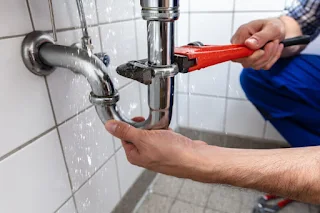Understanding Common Plumbing Problems
1. Leaky Faucets: Leaky faucets waste water and money. Usually, a worn-out washer or O-ring causes this. Turn off the water supply, dismantle the faucet, replace the damaged part, and reassemble it carefully.
2. Clogged Drains: Hair, grease, or debris can clog drains. Use a plunger or a drain snake to clear minor clogs. For tougher ones, try a mixture of hot water, baking soda, and vinegar to dissolve the blockage.
3. Running Toilets: Running toilets are often due to a faulty flapper or a fill valve. Adjust or replace these parts to stop water from continuously running.
4. Low Water Pressure: Sediment buildup in faucets or showerheads can cause low water pressure. Cleaning or replacing these fixtures usually improves the water flow.
5. Burst Pipes: Cold weather or wear and tear can cause pipes to burst. Shut off the main water supply immediately and call a professional plumber to fix this potentially damaging issue.
Tools You Might Need
1. Plunger: A basic tool for clearing clogs in sinks, toilets, and showers.
2. Pipe Wrench: Use this to tighten or loosen pipe fittings.
3. Plumber’s Tape: Helps seal pipe threads and prevent leaks.
4. Drain Snake: Ideal for clearing stubborn clogs deep within pipes.
5. Adjustable Wrench: Useful for various plumbing repairs.
DIY Plumbing Repair Steps
1. Turn Off the Water: Before any repair, shut off the water supply to the affected area.
2. Gather Necessary Tools: Make sure you have the required tools before starting any repair.
3. Identify the Problem: Diagnose the issue to understand what needs fixing.
4. Follow Instructions Carefully: If using online guides or manuals, follow the steps meticulously.
5. Take Safety Precautions: Wear gloves and eye protection to avoid accidents.
When to Call a Professional
While many plumbing issues can be fixed with DIY methods, some problems require professional assistance:
Burst Pipes: Immediate professional help is needed to prevent water damage.
Sewer Line Issues: Sewer line problems are complex and best handled by experts.
Extensive Leaks: Large leaks or hidden leaks may require specialized equipment to detect and fix.
Preventive Measures
Regular maintenance can prevent major plumbing issues:
1. Regular Inspections:
Check for Leaks: Perform routine checks on faucets, pipes under sinks, around toilets, and any visible plumbing fixtures. Look for signs of moisture or dripping. Even small leaks can escalate into significant problems if left unattended.
Inspect Water Pressure: Keep an eye on water pressure. Sudden drops or irregularities in pressure could indicate an issue within your plumbing system.
2. Clog Prevention:
Use Drain Catchers: Install drain catchers in sinks, showers, and tubs to trap hair, soap scum, and other debris. This simple addition can significantly reduce the risk of clogs forming deep within your pipes.
Mind What Goes Down the Drain: Be cautious about what gets flushed or poured down the drains. Avoid disposing of grease, oil, coffee grounds, or large food particles down kitchen sinks. In the bathroom, dispose of items like cotton balls, sanitary products, and wipes in the trash, not the toilet.
Regular Cleaning: Consider periodic cleaning of drains with natural remedies like a mixture of hot water, baking soda, and vinegar to prevent buildup and keep drains flowing smoothly.
3. Seasonal Maintenance:
Winterize Pipes: In colder climates, insulate exposed pipes, especially those outdoors or in unheated areas like basements or attics. This insulation helps prevent freezing, which can lead to pipe bursts.
Garden Hose Maintenance: Disconnect garden hoses before winter sets in and shut off the outdoor water supply. Leaving hoses connected can cause water to freeze in the pipes leading to the hose bib, potentially causing the pipes to burst.
Conclusion
Understanding basic plumbing repairs can save you time and money. While some issues are easily fixable with DIY methods and basic tools, knowing when to call a professional is crucial to prevent further damage. Regular maintenance and preventive measures can also help avoid major plumbing headaches at home. Contact Plumbers In Borehamwood for more information.

